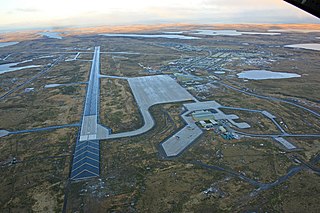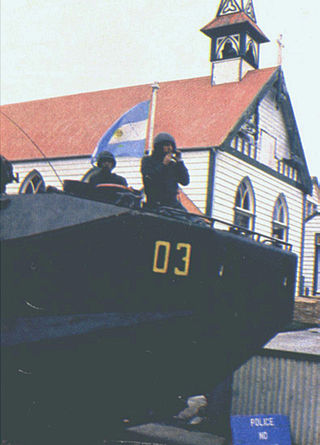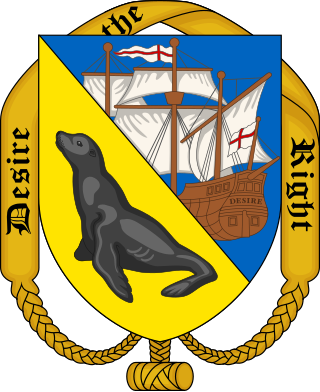Related Research Articles

The history of the Falkland Islands goes back at least five hundred years, with active exploration and colonisation only taking place in the 18th century. Nonetheless, the Falkland Islands have been a matter of controversy, as they have been claimed by the French, British, Spaniards and Argentines at various points.

The Falkland Islands are a British overseas territory and, as such, rely on the United Kingdom for the guarantee of their security. The other UK territories in the South Atlantic, South Georgia and the South Sandwich Islands, fall under the protection of British Forces South Atlantic Islands (BFSAI), formerly known as British Forces Falkland Islands (BFFI), which includes commitments from the British Army, Royal Air Force and Royal Navy. They are headed by the Commander, British Forces South Atlantic Islands (CBFSAI), a brigadier-equivalent appointment that rotates among all three services.

The Falklands War was a ten-week undeclared war between Argentina and the United Kingdom in 1982 over two British dependent territories in the South Atlantic: the Falkland Islands and its territorial dependency, South Georgia and the South Sandwich Islands. The conflict began on 2 April, when Argentina invaded and occupied the Falkland Islands, followed by the invasion of South Georgia the next day. On 5 April, the British government dispatched a naval task force to engage the Argentine Navy and Air Force before making an amphibious assault on the islands. The conflict lasted 74 days and ended with an Argentine surrender on 14 June, returning the islands to British control. In total, 649 Argentine military personnel, 255 British military personnel, and three Falkland Islanders were killed during the hostilities.

Stanley is the capital city of the Falkland Islands. It is located on the island of East Falkland, on a north-facing slope in one of the wettest parts of the islands. At the 2016 census, the city had a population of 2,460. The entire population of the Falkland Islands was 3,398 on Census Day on 9 October 2016.

RAF Mount Pleasant is a Royal Air Force station in the British Overseas Territory of the Falkland Islands. The airfield goes by the motto of "Defend the right" and is part of the British Forces South Atlantic Islands (BFSAI). Home to between 1,000 and 2,000 British military personnel, it is about 33 miles (53 km) southwest of Stanley, the capital of the Falklands—on the island of East Falkland. The world's longest corridor, 2,600 feet (800 m) long, links the barracks, messes, and recreational and welfare areas of the station, and was nicknamed the "Death Star Corridor" by personnel.

The Invasion of the Falkland Islands, code-named Operation Rosario, was a military operation launched by Argentine forces on 2 April 1982, to capture the Falkland Islands, and served as a catalyst for the subsequent Falklands War. The Argentines mounted amphibious landings and the invasion ended with the surrender of Falkland Government House.

Operation Paraquet was the code name for the British military operation to recapture the island of South Georgia from Argentine military control in April 1982 at the start of the Falklands War.

Sir Rex Masterman Hunt, was a British Government diplomat and colonial administrator. He was Governor, Commander-in-Chief, and Vice Admiral of the Falkland Islands between 1980 and September 1985. He became a household name in the United Kingdom during the Falklands War, after the Argentine invasion of the islands in 1982, when he was taken prisoner and temporarily removed from his position.

HMS Endurance was a Royal Navy ice patrol vessel that served from 1967 to 1991. She came to public notice when she was involved in the Falklands War of 1982. The final surrender of the war, in the South Sandwich Islands, took place aboard Endurance.

The Falkland Islands Defence Force (FIDF) is the locally maintained volunteer defence unit in the Falkland Islands, a British Overseas Territory. The FIDF works alongside the military units supplied by the United Kingdom to ensure the security of the islands.
There were many events leading to the 1982 Falklands War between the United Kingdom and Argentina over possession of the Falkland Islands and South Georgia.
Terence John Peck was a member of the Falkland Islands Defence Force who during the 1982 Falklands War became a war hero by spying on the Argentine invaders, subsequently escaping to British lines, acting as a scout for 3rd Battalion, Parachute Regiment, and taking part in the fighting for Mount Longdon. A fiercely patriotic Islander, he vehemently opposed Argentina's claim to the Islands. He later met and befriended an Argentine conscript who served during the war.

Duplicate: List of Falkland Islands-related topics

The invasion of South Georgia, also known as the Battle of Grytviken or Operation Georgias, took place on 3 April 1982, when Argentine Navy forces seized control of the east coast of South Georgia after overpowering a small group of Royal Marines at Grytviken. Though outnumbered, the Royal Marines shot down a helicopter and hit the Argentine corvette ARA Guerrico several times before being forced to surrender. It was one of the first episodes of the Falklands War, immediately succeeding the invasion on the Falkland Islands the day before.

The Bluff Cove air attacks occurred 8 June 1982, during the Falklands War. British troop transport ships were bombed by the Argentine Air Force (FAA) while unloading at Bluff Cove, with significant damage and casualties.

The occupation of the Falkland Islands and South Georgia and the South Sandwich Islands was the short-lived Argentine occupation of a group of British islands in the South Atlantic whose sovereignty has long been disputed by Argentina. Until their invasion on 2 April 1982 by the Argentine military junta, they had been governed by the United Kingdom since it re-established control over them in 1833.
Emma Jane Edwards is a British born, Falkland Islands teacher and politician, who served as a Member of the Legislative Assembly for the Stanley constituency from her election in 2009 until she resigned in 2011. She is the eldest daughter of another MLA, Roger Edwards.
Leona Lucila Vidal Roberts is a Falkland Islands curator, radio broadcaster and politician who has served as a Member of the Legislative Assembly for the Stanley constituency since the 2017 general election. She previously served as Director and Manager of the Falkland Islands Museum and National Trust.

At 10:15 pm (BST) on the night of 14 June 1982, British prime minister Margaret Thatcher announced to the House of Commons that negotiations had begun for the surrender of the Argentine invasion force in the Falkland Islands, ending the Falklands War. Her statement noted that "they are reported to be flying white flags over Port Stanley", the capital of the Falklands. This was based on an erroneous report from a front-line unit; in fact, no white flags are known to have been flown, though Argentine resistance ended, and a ceasefire was in place. The surrender was finalised by 1:30 am BST on 15 June. Thatcher's statement was welcomed from all sides in the House, and she left to join celebrating crowds in Downing Street. She later described the statement as "perhaps the proudest moment of my life".
References
- ↑ Falkland Islands Newsletter, No. 86, March, 2004. Falkland Islands Association. Accessed 14 November 2017
- ↑ "Prince feted as Falklands hero". The Guardian. 14 March 1999. Archived from the original on 24 October 2017. Retrieved 10 November 2017.
- ↑ Bound, Graham (January 2007). Invasion 1982: The Falkland Islanders' Story. Casemate Publishers. pp. 128, 129. ISBN 9781844155187 . Retrieved 10 November 2017.
- ↑ Hooker Jr., Colonel Richard D. (15 August 2014). Wrath Of Achilles: Essays On Command In Battle. Pickle Partners. ISBN 9781782893905 . Retrieved 10 November 2017.
- ↑ "Professor Freedman's Official History Falkland Islanders' Exploits Played Down". MercoPress. 6 July 2005. Retrieved 10 November 2017.